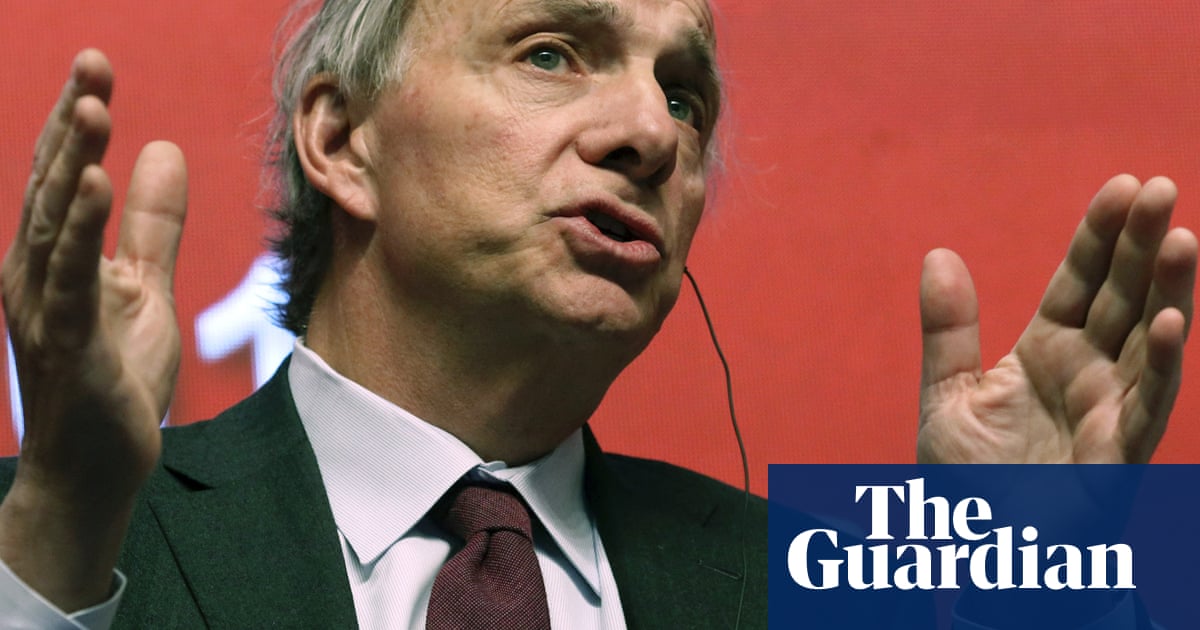Donald Trumpwants to “dictate” policies like those of far-right regimes in the 1930s, a leading billionaire investor has warned.
Ray Daliowrites in a new book that the US president is acting like a chief executive without a board as he seeks to expand executive power even more aggressively than predecessors Andrew Jackson and Franklin D Roosevelt.
Dalio, 75, is the founder of investment firm Bridgewater Associates, one of the world’s biggest hedge funds, and a rare critic of the system that generated his wealth. His bookHow Countries Go Broke: The Big Cycleaddresses thenational debtand Trump’s attacks on democratic norms. The Guardian obtained a copy.
Invoking a decade when fascists such as Adolf Hitler of Germany and Benito Mussolini of Italy were in power, Dalio writes: “When I say that the policies President Trump is using to ‘make America great again’ are remarkably like the policies that those of the hard-right countries in the 1930s used, that should not be controversial.”
He continues: “It would be fair to argue that his attempts to maximise the power of the presidency by bypassing the other branches of government are analogous to the ways that Andrew Jackson (of the right) and Franklin D Roosevelt (of the left) did, though he is even more aggressive than they were. We will see how far he will take it.”
In times of conflict, Dalio notes, aggressive leaders work to eliminate the opposition, make changes to the law to assume special powers and seize control of the media to produce pro-government propaganda. If conflicts become severe, new laws and punishments target the opposition.
Since returning to office in January, Trump has signed a record 152executive orders,concentrating powerand sidelining Congress. He hasdefied court ordersanddetained or deportedimmigrants withoutdue process. He has sought to rewardlaw firms,media companiesanduniversitiesthat bend to his will and punish those that defy him.
“IsDonald Trumpa demagogue?” Dalio asks, describing a demagogue as a political leader who gains power by appealing to people’s emotions, fears, prejudices and desires, typically stirring up populist sentiment and promising easy solutions to complex problems.
“The question is what will the controls be and how far will Trump push things? Unlike for a CEO, there is no board for the US president. Are there effective regulators in place? If so, it is not clear to me who they are.”
Trump’sstrongman styleis a symptom of America’s polarised politics, the author argues. “Donald Trump wants to dictate policies rather than have a classic ‘let’s work together across party lines’ approach to governing. This confrontational approach is an extension of how great internal political conflict has become in recent decades.”
Dalio grew up in a middle-class neighborhood on New York’s Long Island. He began investing at the age of 12 when caddying at a local golf course. He went to Harvard Business School, had short stints at two Wall Street firms andstarted Bridgewater in 1975from a two-bedroom apartment in New York. It went on to become the largest hedge fund in the world.
In How Countries Go Broke, Dalio identifies the government’s debt – currently more than $36tn – as the US’s most serious problem, outlines what he calls the “Big Debt Cycle” and offers advice on how people can protect themselves from the fallout.
The businessman, who correctly predicted the2008 financial crisis, condemns theTrump administration’s cost-cutting measures as likely to have negative consequences because “many people who will be hurt by them will fight back and valuable support systems will be weakened or eliminated”.
He adds that his own wife works to help low-income students in deprived neighbourhoods who suffer from inadequate nutrition. The cancellation ofschool lunch programmeson which they depend “will have terrible second-order consequences”.
Trump’s policies are aimed at moving more money, power and freedom into the hands of the most productive people, Dalio adds. “It’s not easy to manage and improve a country that has been mismanaged and in such a mess while also keeping people happy at a time when democracy is fracturing. I recommend regularly checking on how those in the bottom 60% are doing and feeling.”
